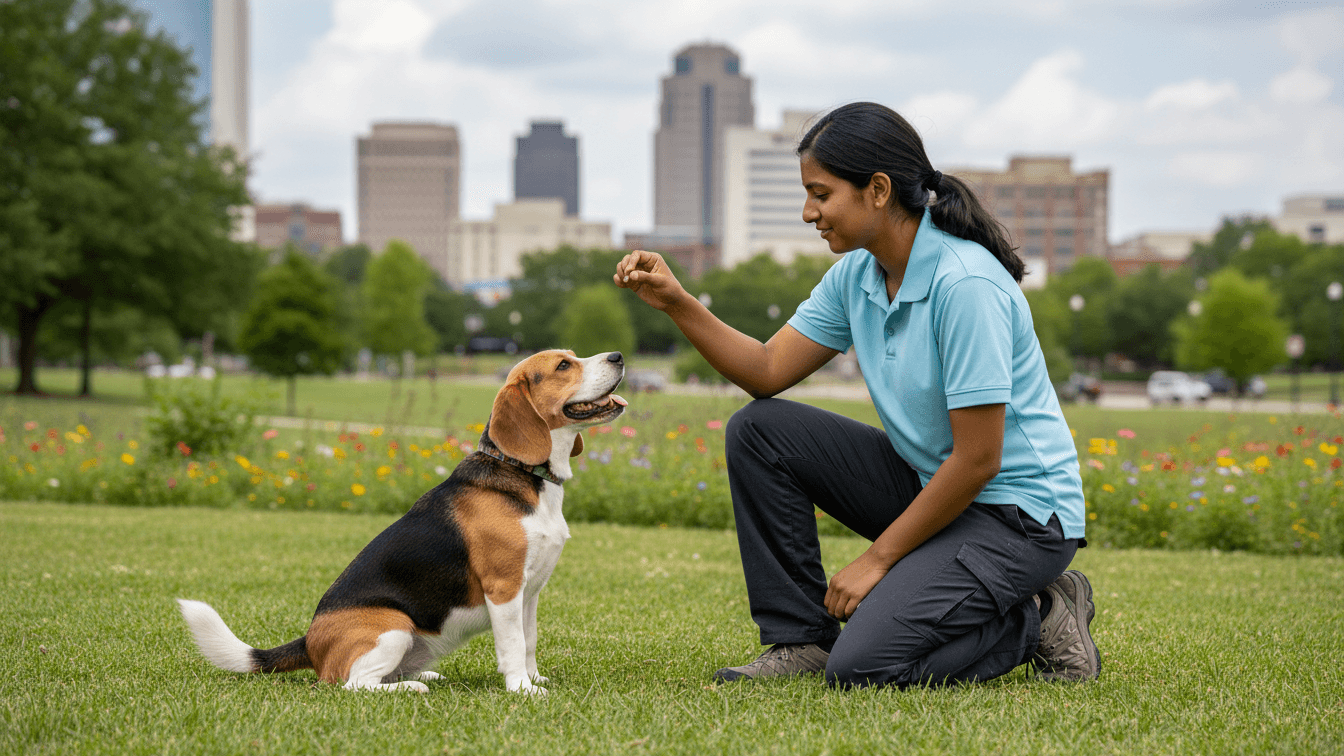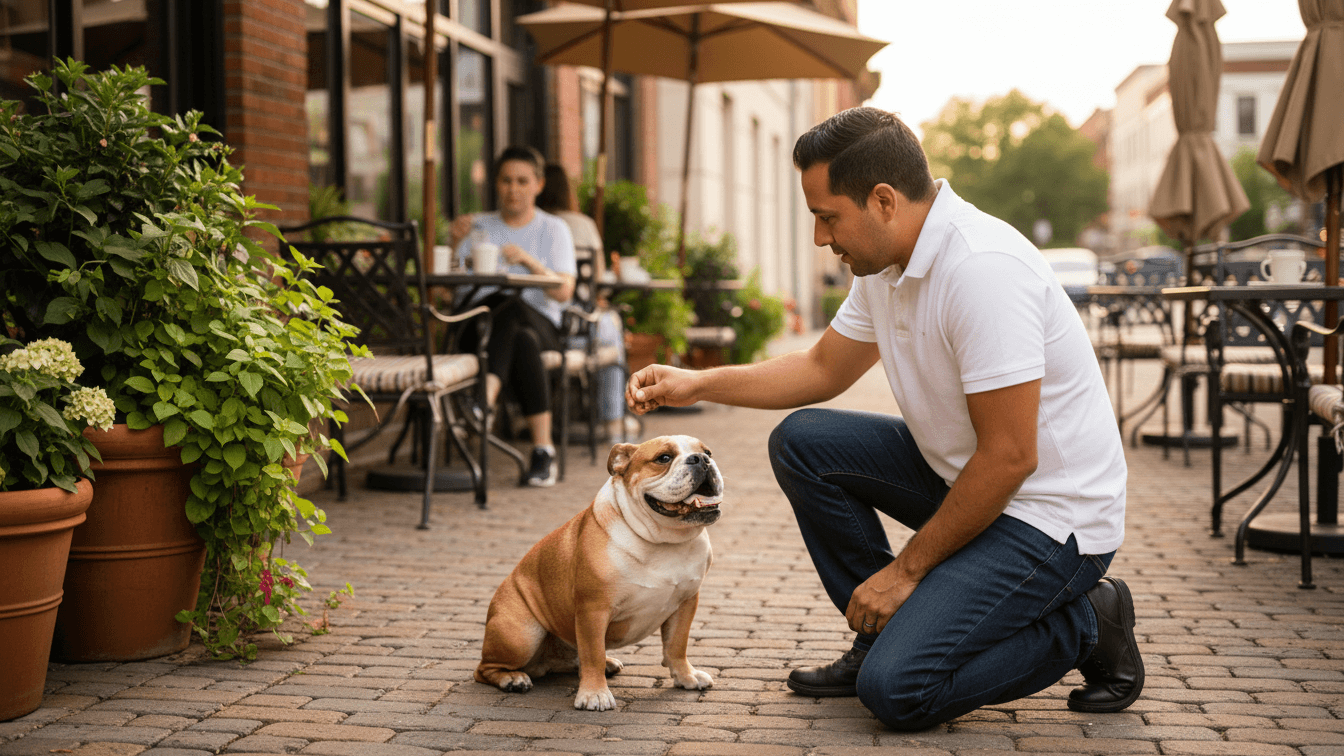Your Complete Guide to Choosing a Dog Trainer in Little Rock, AR and Surrounding Areas
Living in Little Rock means your dog needs to handle busy trails at Pinnacle Mountain, stay calm during River Market events, and walk politely through neighborhoods like Hillcrest and the Heights. Your training goals should prepare your dog for real-life situations, from outdoor dining patios in SoMa to navigating crowds at festivals downtown.
Since Little Rock sits in Pulaski County, most local regulations follow city ordinances and Arkansas state law. When you work with a professional dog trainer who knows these local details, you’ll see faster progress both at home and around the community.
How to Choose the Right Trainer
Start by looking for someone who uses positive reinforcement training and understands what you actually need from your dog. That might mean loose-leash walks on the Arkansas River Trail, polite greetings at Murray Park, or staying focused when kids play soccer at Allsopp Park.
Credentials help you compare experience levels quickly. Common dog trainer certifications include KPA-CTP, CPDT-KA, or IAABC-CDBC for behavior problems. If your dog shows serious aggression or fear issues, look for someone with CBCC-KA or a science-based program like CTC.
In-home dog training works great for door manners, house training, and neighborhood leash skills. Group classes make more sense once your dog can focus around distractions, especially before you try crowded spots like the River Market District on weekends.
Ask about the trainer’s approach to helping your dog learn, not just what they teach. You want someone who can explain why certain methods work and how they’ll customize a training program for your specific goals around Little Rock.
Common Dog Training Methods Explained

Reward-based methods create lasting behavior changes while building trust between you and your dog. They also help you follow Little Rock’s leash laws and noise ordinances without creating stress for your pet.
Basic obedience covers sit, down, stay, place, recall, and leash training so your dog can handle walks, restaurant patios, and park visits without pulling or jumping on strangers. These foundation skills make daily life much easier.
Puppy training focuses on socialization, potty training, bite control, crate comfort, and early leash manners. Starting with short, positive training sessions during your puppy’s first few months prevents bad habits from forming in the first place.
Behavior modification addresses fear, reactivity, resource guarding, or separation anxiety through careful desensitization and counterconditioning. For serious cases, ask if your trainer works with local veterinarians who can help rule out medical causes.
Private lessons and in-home training let you customize everything around your daily routines, while board and train programs can speed up results when you’re short on time. Day training offers a middle option where the trainer works your dog during the day and teaches you how to maintain progress.
Dog training classes help your dog practice good manners around other dogs and people. The best group classes give dogs plenty of space, screen participants carefully, and teach calm behavior rather than just excitement.
Specialized options like therapy dog training or service dog training require extra structure, public-access skills, and a very clear step-by-step plan. Not every trainer offers these programs, so ask about experience with your specific goals.
Stay away from trainers who use fear, intimidation, or pain to get results. Humane training methods are safer for everyone, easier to maintain long term, and much better for keeping peace with your neighbors in close-knit Little Rock communities.
Average Cost of Dog Training in Little Rock, AR (Updated for 2025)
Prices around Little Rock and Pulaski County depend on the trainer’s experience, session length, and whether they come to your home. Here’s what most local dog owners are paying in 2025.
| Service Type | Average Cost (Little Rock/Pulaski County) |
|---|---|
| Puppy classes (4-6 weeks) | $140-$260 total |
| Group obedience classes (4-6 weeks) | $150-$280 total |
| Private lessons (60-90 min) | $100-$180 per session |
| In-home coaching packages (4-6 visits) | $400-$850 total |
| Day training (trainer works your dog + handoff) | $425-$900 per week |
| Behavior consult for reactivity/anxiety (initial) | $140-$240 |
| Board and train (2-4 weeks) | $1,900-$4,200 total |
You’ll probably pay extra travel fees for locations farther from central Little Rock, and expect higher rates for aggressive dog training or complex behavior work.
Make sure you understand what’s included in the price, how the trainer tracks progress, and whether they offer a free consultation or free evaluation before you commit to a full program.
Questions to Ask a Potential Dog Trainer
- What training methods do you use, and how do you keep sessions positive and low-stress for my dog?
- What credentials do you have, like CPDT-KSA or KPA-CTP? Do you keep up with continuing education?
- How will you customize the training program for my dog’s specific needs and our Little Rock lifestyle?
- Do you offer in-home visits, dog training classes, or day training, and which approach fits my goals best?
- How will we measure my dog’s progress and know when to add more distractions?
- What are the total costs, including any travel fees, and what’s your cancellation policy?
- Do you carry liability insurance, and can you show me proof?
- For behavior problems, will you work with my veterinarian if needed?
- What should I practice between training sessions to help my dog keep improving?
Local Little Rock and Pulaski County Rules and Considerations
Little Rock enforces leash laws and nuisance ordinances to keep parks and neighborhoods safe for everyone. Pulaski County and Arkansas state law set additional requirements for rabies vaccination and animal welfare.
Leashes are required in all public spaces except inside designated off-leash dog parks. Keep a standard 6-foot leash with you for city trails, River Market, and community events.
Arkansas law requires current rabies vaccination for all dogs, and Little Rock requires dogs to be registered with the city. You can get rabies vaccines through local veterinary clinics and find registration information through the Little Rock Animal Village.
Excessive barking can be considered a nuisance under city ordinances, so work with your trainer on alert barking and separation anxiety before neighbors start complaining. If your trainer wants to use city parks for commercial training sessions, they may need permits and proof of insurance.
Little Rock Animal Village provides resources for lost pets, microchips, licensing, and other city services for dog owners.
Local Little Rock Resources for Dog Owners
These spots give you great places to practice polite manners, work on recalls, and provide safe enrichment for your dog. Always follow posted rules and etiquette guidelines.
- Murray Park Dog Park offers a large fenced area where you can practice recall and calm greetings. Visit during quieter weekday mornings when you’re starting out.
- War Memorial Park Dog Park provides separate areas for large and small dogs, making it easier to help your dog build confidence and socialization skills.
- Burns Park Dog Park in North Little Rock sits just across the river and gives you another option for off-leash practice in a safe, fenced space.
- Arkansas River Trail welcomes leashed dogs for miles of walking and jogging routes, perfect for building focus around cyclists, runners, and wildlife.
- Pinnacle Mountain State Park allows leashed dogs on most trails, giving you opportunities to practice leash manners around more challenging terrain and distractions.

FAQs
How much does in-home dog training cost?
Most Little Rock trainers charge $100-$180 per in-home visit, with discounts available when you buy packages of four to six sessions. Behavior problems and reactivity typically start at the higher end of that range.
Is in-home dog training worth it?
Absolutely, because you’re working on problems exactly where they happen. Your trainer can fix door manners, jumping on guests, counter-surfing, and yard reactivity right at home, then step outside to practice leash skills on your actual neighborhood sidewalks in Hillcrest or the Heights.
Can you pay someone to house train your dog?
Yes, many trainers offer puppy training programs that include potty training, crate routines, and daily schedules. Day training can speed up the process while teaching you how to maintain the progress on your own.
What is the 3-3-3 rule for dog training?
This is a helpful timeline for new or adopted dogs: expect about 3 days for your dog to decompress, 3 weeks to learn your routines, and 3 months to feel completely settled. Good training programs work with this natural adjustment period instead of rushing the process.
How long will it take to reach my training goals?
Most puppies and friendly adult dogs show solid progress within 4-8 weeks if you practice daily between training sessions. Fear, reactivity, or aggression typically requires several months of careful behavior modification with gradual increases in difficulty.
What should I bring to group classes?
Pack a flat collar or harness, a 6-foot leash, high-value treats your dog loves, water, and current vaccination records if your trainer requests them. Leave retractable leashes at home for safety reasons.
What’s the leash law in Little Rock?
Dogs must be leashed and under control in all public areas, except inside designated off-leash dog parks. Keep that 6-foot leash handy for city greenways, playgrounds, River Market, and community events.
Do I need a dog license in Little Rock or Pulaski County?
Yes, Little Rock requires dogs to be registered with the city and to wear current rabies tags. You can register your dog through Little Rock Animal Village and keep vaccination records up to date through your veterinarian.
What shots does my dog need in Pulaski County or Arkansas?
Rabies vaccination is required throughout Arkansas for all dogs. Your veterinarian may also recommend distemper-parvo and bordetella based on your dog’s lifestyle and exposure to other dogs in training classes or dog parks.
Are dog trainers required to be licensed in Little Rock or Pulaski County or Arkansas?
No special trainer licenses exist in Arkansas for dog obedience training or dog training services. Trainers follow normal business regulations, but if they offer board and train services, their facility may need to meet state boarding kennel requirements through the Arkansas Livestock and Poultry Commission.
Where can I practice off-leash recall?
Use fenced dog parks like Murray Park Dog Park, War Memorial Park Dog Park, or Burns Park Dog Park to keep things safe and legal. Try visiting during quieter hours when you’re starting out with a well-behaved dog.
Which dog parks allow training around Little Rock?
Murray Park Dog Park and War Memorial Park Dog Park both allow off-leash play within their fenced areas. Burns Park Dog Park in North Little Rock is another solid option for training for dogs in a controlled environment.
What beaches or trails allow dogs for training?
While there aren’t beaches in Little Rock, leashed dogs are welcome on most trails at Pinnacle Mountain State Park and throughout the Arkansas River Trail system. These trails are perfect for teaching calm focus around hikers, families, and wildlife.
What if my dog is reactive or shows aggression?
Look for a certified dog trainer with specific experience in behavior modification. Reactivity and aggression require careful desensitization work, often starting in quiet locations before gradually adding distractions. A good trainer will help you avoid situations that might make things worse while building your dog’s confidence.
Can I bring my puppy to dog parks?
Wait until your puppy has completed their vaccination series and is at least 4 months old. Even then, carefully observe the energy level at the park before entering. Overwhelming experiences during puppies’ critical socialization period can create fear or reactivity later.
The right combination of thoughtful planning, humane methods, and consistent practice around Little Rock’s parks and neighborhoods will help your dog become a confident, well-mannered companion. When you’re ready to start, ask potential trainers about their dog trainer certifications and how they stay current with new techniques.
